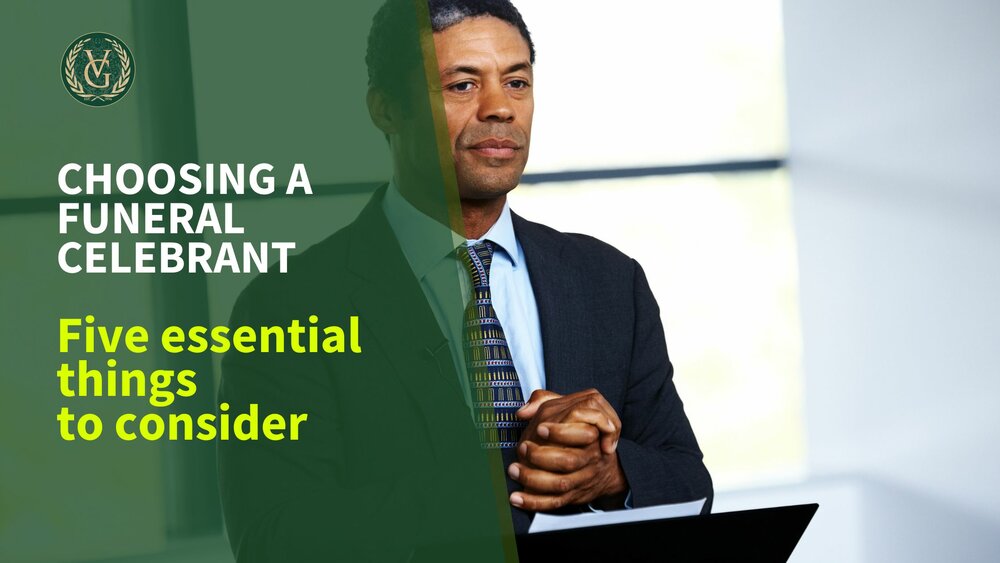Five Essential Things to Consider When Choosing a Funeral Celebrant
Amid grief, choosing a funeral celebrant who truly understands your family's needs can provide profound comfort and solace.
The funeral celebrant or officiant plays a crucial role in end-of-life events. They lead the service, including the eulogy, as well as any religious elements, and inform guests of post-ceremony events such as the burial or repast. Because they are so key to honoring your loved one, it’s important that you trust the officiant you select and feel comfortable with them.
In this article, we will examine some key questions and considerations for choosing a funeral celebrant so you can make the best and most informed decision.
What type of service will you be having?
Every officiant will bring their own style and personalization to the service, and the type of ceremony your family wants will often influence your choice of officiant. A traditional funeral is not the right fit for everyone, and not all services are religious. You might be considering a less formal memorial service or a vivacious celebration of life. Consider the overall atmosphere you wish to create as you select the officiant. The celebrant you choose should enhance the service and make your day easier.
What were your loved one’s wishes?
Above all, it’s important to follow any wishes your loved one shared and consider their values, beliefs and lifestyle. For example, were they deeply religious or spiritual? Were they agnostic? Were they free-spirited or on the conservative side? Some celebrants specialize only in traditional services, which you may prefer if you are planning a formal religious funeral. Others choose to limit their focus to green funerals or themed life celebrations. Just as your loved one had their own unique character and personality, funeral officiants are available across a spectrum of styles and beliefs.
Who can officiate?
There is no legal certification or professional experience required to officiate a funeral. If you or a family member wants to be the guiding voice of a service, that is perfectly acceptable. Keep in mind, however, that hiring an experienced funeral celebrant does have its advantages. There is much to consider with leading a funeral service and in times of grief, it’s even more stressful. An experienced officiant will be able to suggest an appropriate structure, and you can work with them to customize it so it is personalized for your family’s preferences.
What are your choices for an officiant?
- Religious clergy: This is usually a minister, priest, or rabbi who can incorporate traditional religious rituals and prayers into the service, providing spiritual guidance and comfort.
- Funeral director: Because they are accustomed to working with grieving family members, funeral directors are a popular non-religious choice. They have specific knowledge about remembrance events and can relieve some of the pressure of planning this important day.
- Funeral celebrant: Professionally trained in creating personalized ceremonies, funeral celebrants are able to craft a service that reflects the deceased’s life and the family's wishes, regardless of religious affiliation.
- Family member or friend: Loved ones can offer deeply personal and heartfelt tributes, sharing unique stories and memories that honor the life of the departed. As noted above, it can be extremely difficult for someone close to the person who died to run a meaningful service. Emotions will be high, and grief is unpredictable, so it is usually advisable to find someone outside of the immediate circle of grieving friends and family.
What questions will help you find the right officiant?
As you search for the right person to deliver the funeral, you might have specifics in mind for the service, like a venue, speakers, songs, stories, or hymns. It is important to find an officiant who will work with you to create a program that embodies your preferences and honors the memory of your loved one. Consider things like:
- Are they aligned with your vision for the service?
- Are they presenting a structure you feel comfortable with?
- How willing are they to collaborate with you?
Ultimately, it’s important to find an officiant who you’re comfortable working with when emotions are running high and who you trust with your grief. They will take the lead so you and your family can be fully present during the service and can mourn your loved one together.
We hope you find this information about choosing a funeral celebrant helpful. If you need additional assistance with the selection of an officiant or if you wish to make funeral arrangements, please contact us.
About Vaughn Greene Funeral Services: For more than 25 years, Vaughn Greene Funeral Services has been providing a ministry of care to Baltimore’s African American community. As a leading local, minority- and family-owned provider, we promise to provide our highest level of service and respect to families who entrust us to honor their loved ones. For more information about our funeral, cremation, memorial, repast, and grief counseling services, please call us at 410.655.0015 or visit us online at https://vaughncgreene.com/.











Comments